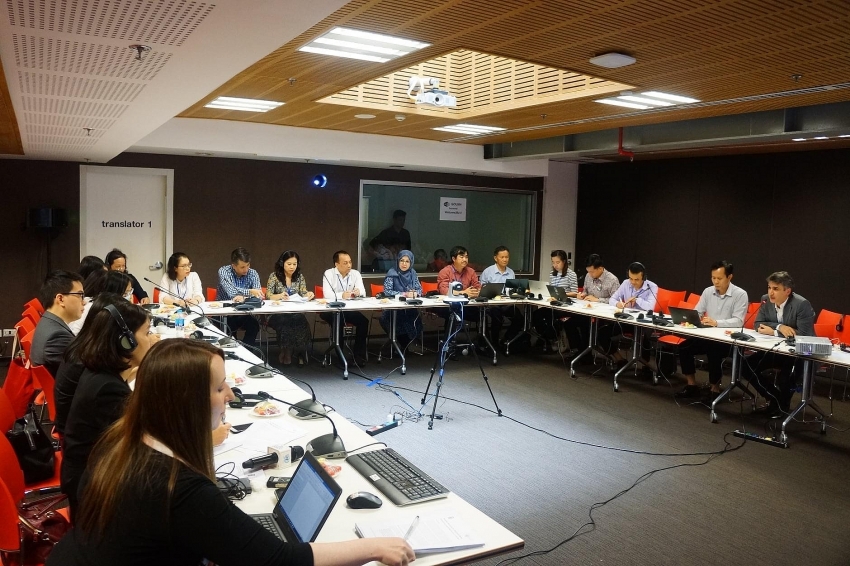UNDP holds workshop on disaster risk finance and inclusive insurance
The workshop aimed to gain a comprehensive understanding of the Vietnamese context and identify the possible interventions and technical support needed for the country, which has been selected as one of the first 10 countries to participate in a new UNDP global initiative under its new Insurance and Risk Finance Facility (IRFF) to make inclusive insurance and risk financing central to development.
 |
| The UNDP workshop has seen in-depth discussions on an upcoming diagnostic study on disaster risk finance and inclusive insurance |
This new initiative has been designed jointly with the Insurance Development Forum (IDF) and is financially supported by the German government. The UNDP will also work with the InsuResilience Solutions Fund (ISF) and global insurance industry partners to develop new disaster risk financing and insurance products to reduce the negative impacts of disasters.
Risk financing and inclusive insurance are important to protect lives, livelihoods, infrastructure, and homes from the impact of disasters, but also to provide coverage for sustainably protecting healthcare and education services, as well as employment, and agricultural supply chains. However, little attention has been paid to risk financing at the global and country levels.
There is, for example, a huge protection gap in developing countries (including Vietnam), where less than 5 per cent of losses due to disasters are covered by insurance, as compared to over 50 per cent in high-income countries. These protection gaps are also prevalent beyond disaster losses, resulting in increased expenses in healthcare and losses in property, livelihoods, and agriculture.
Research into multi-aspect disaster risk financing suggests that different insurance schemes could potentially reduce losses from disasters in the poorest countries by as much as 25 per cent through a range of risk financing tools, including parametric insurance, insurance-backed social protection, and indemnity-based products.
As a first step in the unfolding of this new initiative in Vietnam, the UNDP is carrying out a diagnostic study. The study, which will cover significant areas across the inter-related disciplines of insurance and risk finance, will help to articulate the evolution of the insurance supply side; develop a picture of the demand side; ascertain the gaps and opportunities in creating an enabling environment through government policy and regulatory environment; recommend means of building regulatory capacities; assess the financial standing of the insurance companies; and suggest suitable approaches towards developing new market opportunities. It will also help to generate an information profile for Vietnam and the knowledge relevant for inclusive insurance, such as providing the demographic, socio-economic, and sectoral context for developing insurance and risk transfer solutions.
According to Sitara Syed, UNDP deputy resident representative in Vietnam, who spoke at the workshop, “the concept of disaster risk financing is still relatively new in Vietnam, but the opportunities are considerable. In addition to putting national and local governments in a stronger position to plan for disasters ahead of time, a more enabling environment could also support quicker and more efficient response and recovery work for when disasters inevitably occur.”
“This initiative will require a significant level of support and collaboration with government ministries, such as the Ministry of Finance, as well as provincial and local authorities, development partners, insurance industry partners, and the private sector,” Syed highlighted.What the stars mean:
★ Poor ★ ★ Promising ★★★ Good ★★★★ Very good ★★★★★ Exceptional
 Tag:
Tag:
Related Contents
Latest News
More News
- Shinhan Life Vietnam builds growth on people strategy (October 07, 2025 | 09:45)
- Insurance sector initiates rapid response after Typhoon Bualoi devastation (October 03, 2025 | 18:25)
- Non-life insurers face mounting pressure after typhoon hits motor sector (October 02, 2025 | 18:59)
- Prudential Vietnam delivers responsible investment package (September 25, 2025 | 10:37)
- Insurers struggle to keep pace with EV rapid adoption (August 29, 2025 | 17:12)
- Non-life insurance market in sees bright spots in H1 despite rising challenges (August 28, 2025 | 16:21)
- Life insurance rebounds with renewed growth and trust (August 06, 2025 | 18:04)
- Global Care launches Vietnam’s first insurance KOL platform (July 25, 2025 | 09:42)
- Liberty Insurance leaves mark at 2025 Insurance Asia Awards with dual wins (July 14, 2025 | 07:27)
- New CEO takes helm at Prudential Vietnam (July 07, 2025 | 17:51)

























 Mobile Version
Mobile Version